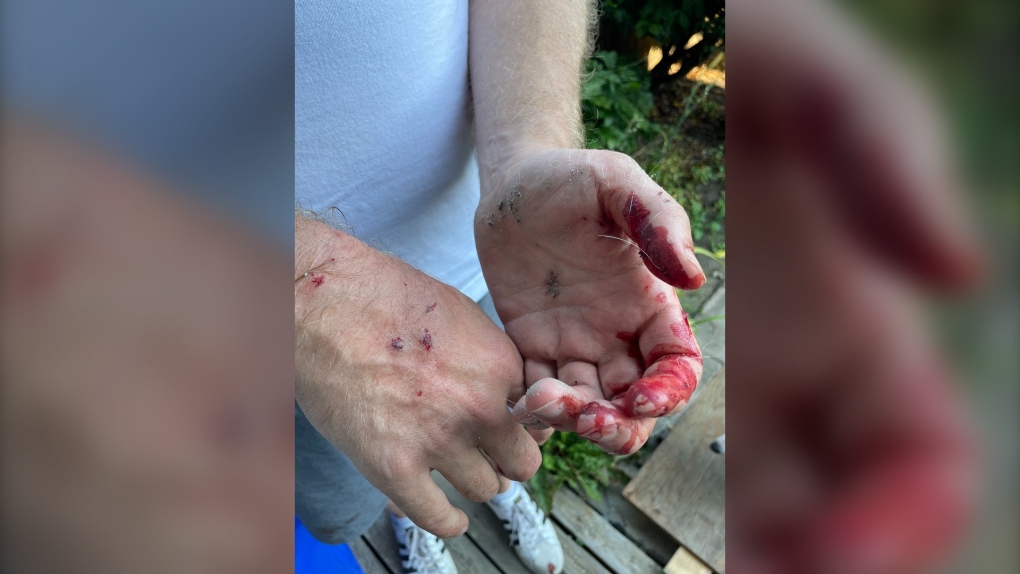Pit bull was off-leash in children's care, B.C. woman says after attack
 Laura Wong says a pitbull attacked her corgi, Miles, at an off-leash park in Coquitlam, B.C., on Aug. 6, 2024.
Laura Wong says a pitbull attacked her corgi, Miles, at an off-leash park in Coquitlam, B.C., on Aug. 6, 2024.
A woman whose corgi was attacked by a pit bull in a Coquitlam, B.C., dog park last week is questioning whether families should allow certain pets off-leash in public – particularly in the care of unaccompanied minors.
The incident happened while Laura Wong and a friend were playing fetch with her dog Miles at the off-leash area of Mundy Park on Aug. 6.
"We noticed a pit bull lunge toward Miles," Wong said. "We can see Miles is screaming in pain, and the pit bull has a solid grip on the back of Miles’s neck."
Wong said her friend tried to pry the pit bull’s jaws open, suffering several punctures on his hands in the process, which left them covered in blood.
Meanwhile, Wong was clutching Miles in her arms – and when the other dog finally released him, Wong tumbled onto the gravel and scraped her back.
Wong said her friend required treatment in urgent care. Miles had bite wounds to his neck and ear, resulting in a nearly $600 veterinary bill that the pit bull's owner eventually agreed to cover.
No adult present during attack
One thing that stuck out to Wong as the chaotic incident was unfolding is that the pit bull’s owner was nowhere to be seen – the dog was in the care of two young girls she estimated to be between the ages of 12 and 16.
"They were unable to physically restrain or command their dog in any way to release her grip," Wong said.
She decided to speak out over concerns about the behaviour of dog owners – as opposed to the dogs themselves – following the off-leash attack in Stanley Park that left another family’s pet dead earlier this month.
 Wong said her friend suffered several wounds to his hands trying to protect her corgi from the attack.
Wong said her friend suffered several wounds to his hands trying to protect her corgi from the attack.
"I would expect that any responsible dog owner that cares for their dog – and cares for the people around them – would not be negligent, and would be able to control their animal," she said.
"We may not be so lucky the next time around this happens."
Wong reported the attack to Coquitlam animal control the next day. CTV News has asked the city whether the same dog has been involved in any prior incidents, but has not received a response.
Training is key, says behaviour expert
While some are quick to blame breeds for incidents like these, the B.C. SPCA said any large dog can become a problem if not properly socialized – and if the owner does not pay attention.
Kim Monteith, the SPCA's manager of behaviour and welfare, said many owners assume their pet enjoys going to off-leash dog parks to interact with other dogs of all shapes and sizes, and that isn’t always the case.
"We tend to automatically think dogs like to play with other dogs," Monteith said. "But that comes from socializing your dog at puppy age. There’s a window when we can socialize them, teach them how to play appropriately, how to get along with other puppies."
 Miles has his own Instagram account under the handle @milestheloaf.
Miles has his own Instagram account under the handle @milestheloaf.
Even those that are properly socialized can have their breaking point, Monteith added – and it's up to owners to recognize body language and other signals that indicate their pet isn't having fun.
"They can be like toddlers where they play too much, or maybe get hungry, and then they’ve had enough," she said.
Dogs can also become more selective about the animals they are willing to tolerate as they get older – mirroring human behaviour once again.
“Think about when you were a child and had lots of friends,” Monteith said. “As we get older, we maybe get pickier about our friends. Dogs are the same way.”
Different bylaws in Metro Vancouver
Some municipalities in Metro Vancouver have breed-specific legislation requiring pit bulls to be muzzled and leashed at all times in public, even if they have never harmed anyone.
That includes Burnaby, which automatically classifies pit bulls as “vicious dogs” – a category other dogs are only placed under if they have previously attacked a human or pet “without provocation.”
The B.C. SPCA does not support breed-specific legislation, arguing that a number of factors outside of genetics contribute to canine aggression, including overall fearfulness, unaddressed injuries or disease, and whether the animals have been spayed or neutered.
“Breed-specific legislation treads upon the rights of responsible dog guardians who cherish a non-aggressive pet whose breed may fall under the legislation,” reads a position statement from the animal welfare organization. “Conversely, the guardian of an aggressive pet whose breed does not fall within the legislation will not be subject to appropriate legislative remedies.”
After a dog attack, Monteith said the best course of action is to reach out to a trainer – particularly one that has been accredited by the SPCA, which helps ensure a humane and professional approach, given that the industry is unregulated in the province.
“Take it seriously. Dogs don’t have to like every person or every animal, but we need them to live amongst us in our communities,” Monteith said.
“We have to know our dogs and recognize when something’s off – and maybe change what we do for them if they’re not really enjoying it.”
CTVNews.ca Top Stories

Heavy snow, freezing rain warnings hit parts of Canada, expected to last throughout Monday
Significant snowfall and heavy rain hit parts of Canada on Sunday and the weather system is expected to continue into Monday morning and throughout the day.
BoC expected to lower interest rates again, with odds leaning toward larger cut
Financial markets and forecasters are betting on another jumbo interest rate cut from the Bank of Canada this week.
The Canada Post strike involving more than 55,000 has hit 25 days
The Canada Post strike involving more than 55,000 workers has hit 25 days.
Celebrities spotted at Taylor Swift's final Eras Tour performance in Vancouver
Taylor Swift fans from around the world gathered in Vancouver on Sunday to witness the final performance of her massively popular Eras Tour, including a few celebrities.
Government faces third Tory non-confidence vote ahead of potential fiscal hurdle
The Liberals are set to face a third Conservative non-confidence vote today, but the government is likely to survive with the support of the NDP.
U.S. should be concerned about illegal immigration from Canada: Canadian survey
More than 80 per cent of Canadians believe the flow of illegal immigrants from Canada to the U.S. is a concern, according to a new survey.
Jay-Z denies allegations he sexually assaulted a 13-year-old in 2000 with Sean 'Diddy' Combs
A woman who alleges she was sexually assaulted by Sean 'Diddy' Combs has amended her lawsuit to include allegations that she was also assaulted by Jay-Z at the same party.
Taylor Swift ends record-smashing Eras Tour in Vancouver, after glittering global run
Taylor Swift took the stage for the final time on her record-smashing Eras Tour, watched by tens of thousands of delirious fans in Vancouver's BC Place arena and by millions on livestreams around the world.
Syrian prime minister says government is still functioning but foreign and domestic challenges loom
Syria's prime minister said Monday that most cabinet ministers are still working from offices in Damascus after rebels entered the capital over the weekend and overthrew President Bashar Assad. Streams of refugees crossed in from neighboring countries, hoping for a more peaceful future.






























